It was easily one of the most out-there story ideas I’d ever heard, especially over the phone. But I loved it immediately.
The guy talking in my ear was Wes Orloff, a longtime Wisconsin road racer and Harley-Davidson engineer with an engineer girlfriend (Leah, now his wife, who also worked for H-D) and a band of friends with all sorts of racing and mechanical skills.
Their idea, simply put, was this: Gather everyone at Mid-Ohio during the AMA’s annual Vintage Motorcycle Days event, yours truly included; find a suitable motorcycle to buy from the giant swap meet; race-prep it using only parts scrounged from said swap meet; and have me race it that weekend for a magazine story. Easy, right?
The team had a name for their crazy plan, too: MOMBA, which stood for Mid-Ohio Motorcycle Build Attempt. Hearing that they had a name for the effort, I should have known they were already pretty serious, and a lot farther down the road than a simply a crazy idea generated over beers.
“Okay,” I told Orloff, “I’m in.”
Over the next several weeks I'd learn what this talented group of engineers, designers, racers, fabricators, mechanics, accountants, videographers, teachers, cooks, roller-derby queens, and bartenders were up to: several in-person meetings, many involved emails, research on potential donor bikes, analysis of AHRMA (American Historic Racing Motorcycle Association) rules, and much more.
Selecting a class and the appropriate bike or bikes to look for took time. "Originally,” says Orloff, “we thought we'd go with a 350 or 500cc Sportsman bike [four-stroke singles, twins or triples manufactured prior to 1973]. Problem was, competitive Sportsman bikes were built with many highly developed parts, not stuff you'd likely find at a swap meet. So we took a look at AHRMA's then-new Vintage Superbike class—original Superbikes based on UJMs of the late '70s and early '80s, of which there should be plenty. We decided to pursue that class, and felt our best chance for success was in Middleweight Superbike." Unlike their larger-displacement cousins, eligible bikes—Honda CB550/650s, Kawasaki KZ550/650s, Suzuki GS550s, etc.—were mostly ignored by collectors at the time, and would likely be available at the swap meet cheap...or so everyone thought.
The team put its heads together, analyzing the strengths and weaknesses of dozens of models to select a specific platform so it could go to Mid-Ohio with a singular vision and not waste precious time. "Rick Goldberg researched the Yamahas, Andy Mauk the Suzukis, Matt Weglarz the Hondas, and Chad Shields the Kawasakis," Orloff remembers. "These guys submitted reports any engineering organization would be proud of." Based on those reports, the team chose the Kawasaki KZ550/GPz550, with the KZ650 as a backup. They were, at the time, reasonably plentiful and very bulletproof.
"The idea of cheating—you know, planting parts we'd need—came up," adds Orloff, "but never from the team." Instead, the guys and gals played it straight, with a couple of deviations. Because safety was paramount, they decided the bike must have a new chain, brake pads, and tires. The former from a local dealer, the latter from the Bridgestone rep at the track.
The second deviation involved the 685cc displacement limit allowed by class rules for inline-fours. To that end, the team sourced larger pistons, rings, and a re-sleeved cylinder block beforehand from friends at Wiseco, Advanced Sleeve, and Cometic Gasket. The result would be 615cc, still well below the class limit.
Team responsibilities were designated and specific. Orloff would be Supreme MOMBA, with others tasked according to their skills. "Our team was full of talent, and I needed to take advantage of those strengths by putting people where they'd have the most effect," says Orloff. "Because no one was getting paid, the rewards would be having fun and a job well done."
By the time VMD 2006 was just days away, and trucks were being loaded, enthusiasm was, according to Orloff, “off the charts.”
Team members arrived at Mid-Ohio's front gate at 5 a.m. after driving all night. "The pits opened at 7 and we immediately unloaded and set up shop," Orloff remembers. "AHRMA and Mid-Ohio reserved a prime spot for us with great accessibility, visibility and, most importantly, power. We got 110 percent support; they're both great organizations." The team's goal for Thursday was to acquire a donor bike and disassemble it by evening. When the swap meet opened its gates to vendors at noon, bleary-eyed MOMBA members were on the case.
"We were confident we'd have a large selection of GPzs to choose from," Orloff remembers. "Worst case would be a load of KZ550s. Turns out there were no KZs or GPzs at all! Most of the team was out scouring the swap meet, but Chad Shields, Leah and Lindsay Mauk took it a step farther by running up and down the mile-long line of vendors waiting to get into the track, inquiring about KZs or GPzs."
By Thursday afternoon, with no target bike yet purchased, depression set in. "Thursday was the low point for me," says Orloff. "Everyone was tired from the trip and lack of sleep. I was close to panicking. I'd dragged all my friends down to this god-awful-hot swap meet and we still hadn't found a bike. I had a national magazine editor flying in. I had a dozen of my closest friends about to get publicly humiliated. I'd signed up every sponsor, friend and family member I knew to help support an attempt that was fizzling in front of my eyes.
"Then, Rick Goldberg called with good news. He and his wife Liz had found a KZ550! The bad news was it was the LTD low-rider, buckhorn-bar, cruiser version. It also didn't meet our criteria of a 100-percent runner, the bike burbling on only two cylinders. It shifted well, though, and at $400 the price was right. A compression and spark test showed the engine to be mostly healthy, despite a set of severely neglected carburetors."
The team then took a quick break and met back in the pits. "After some lively discussion, we decided the LTD was our best option," Orloff says, "It was fugly, but it was a KZ550. I was torn between the relief of finding a bike and the horror that the bike was a cruiser!"
A ratty KZ750 was found and purchased for $250 shortly thereafter, shifting the plan to using the LTD engine in the KZ's more race-worthy chassis. This generated great excitement in the MOMBA pit, where both bikes were rapidly torn down and inspected.
Not all was well, however. "For some reason, the guys thought they could put the LTD motor in the 750 frame," remembers Lindsay Mauk. "The excitement of having something to work on and a plan of attack, I think, overshadowed the reality of the rules. And we had some miscommunication, too, someone saying the idea had been 'cleared' by AHRMA. My gut told me I should make sure, so I stuck my nose in the rulebook and found a rule that read, 'Engines and frames must be from the same model.' So it was Thursday night, the guys were at least two hours into some serious work, and I showed them this! Making my friends so sad was one of the worst feelings ever.
"Of course, I have some pretty creative and resourceful friends, and they figured out a plan: Use the 550, brace the frame, build the motor and make it the fastest damn Kawasaki LTD ever, even if we had to use the bike's funky tank, seat and fenders. The buzz was back in the MOMBA compound!"
Added Goldberg, "After the decision was made, I remember someone voicing the rhetorical question, 'Wonder what Mitch will think of racing an LTD?'"
Orloff picks up the tale: "So the thrash was on! Leah and I teamed up on the engine, while others dealt with the plugged carbs and chassis mods. Amazingly, except for heavy carbon, the 13,000-mile engine was in good shape. We pulled off the cylinder, removed the pistons and carefully disassembled the head, labeling and bagging everything. It was now 2 a.m., and I was literally having difficulty seeing straight."
With the summer's heat wave in full swing, Friday morning dawned terribly hot and humid. The team had managed to finish the head, but when the 3mm-over cylinder block and pistons arrived, they were horrified to discover the gasket kit didn't include a base gasket. In an amazing display of skill and creativity, designer Andrew Shabica created a new gasket with spray paint, gasket material, and an X-acto knife—and it ended up not leaking a drop!
The team ran into another obstacle fitting the fresh pistons and rings into the cylinder, as the ring compressors brought along weren't the correct size. "We tried everything from hose clamps to zip ties," says Orloff, "and finally got the two middle pistons started—only to find out I'd caught the edge of one of the oil-control rings and bent the @#$% out of it." With no spares, the team's only option was to try to bend the ring back into shape, and hope for the best.
By midnight, the engine was rebuilt and the cams timed. The engine—now displacing 615cc and featuring an on-site ported head from Joe Koenig and Speed Products—was bolted into the radically braced LTD frame. "I was shocked at how far the chassis had come," says Orloff. Helping the cause was a set of 17-inch cast wheels, calipers, and discs from a '94 Suzuki Katana 600 purchased for a mere $200.
I arrived at Mid-Ohio mid-day Friday, just as the frame was being braced and the engine's top-end was going back together. There was plenty of consternation flowing: Team members were feeling pretty good about things, but not knowing them, not knowing how far they'd come or how hard they'd struggled to get to this point, I wasn't feeling many positive vibes. I mean, there was an ugly, bare frame from a cruiser on an elevated workstand, a dozen people scurrying around with saws and torches and tools and grinders in their hands, two or three people working on a mostly disassembled engine on a nearby workbench, and large piles of rusty, unused cruiser parts along with two motorcycle carcasses lying nearby, one with a fur seat! The people were sweethearts, all of them, and they welcomed me warmly. But this whole thing was looking pretty freakish.
"One of the great memories of Friday night occurred after midnight," continues Orloff. "There was a light fog that made our pit lighting look very dramatic, and we were surrounded by a dozen or so AHRMA racers who'd just gotten back from the flat-track races. Four of our guys were busy thrashing on the chassis, grinder sparks flying. And in the center were four women, led by Leah, rebuilding the carburetors. This was after a long, hard and very hot 20-hour day, which included dozens of rides through the vast swap meet [50 miles worth!] to procure needed parts. I realized then that this team was very special. If I had any doubts the bike would get on-track, they were now gone."
The team finally called it quits at 3 a.m., retiring to tents, truck cabs, and trailers.
While Orloff bounced back and forth between the project and his own racebikes, work continued at warp speed in the MOMBA compound, the bike looking more like a real racer with each passing hour. MV Agusta was that year's featured marque at VMD, and then-importer Larry Ferracci generously offered us some much-needed track time during the three-hour session he'd scheduled for his customers and dealers that evening.
"Our goal," says Orloff, "was to have the bike ready to ride by then for its first shakedown test." The fabrication and parts procurement that happened Saturday was incredible. The bike sported a trick four-into-one stepped header built from three separate systems, custom caliper brackets, a fork brace made from a Honda CR250 lower triple-clamp, a custom aluminum-sheet bellypan, braided steel brake lines, rebuilt fork and brake calipers from the KZ750, 15-inch-long shocks from an old Honda Elsinore motocrosser, and much more.
"Finally, around 5 p.m., we filled the tank with fuel and the team gave me the honor of trying to start it," says Orloff. "I don't think it cranked for more than a second before burbling to life to the cheers of the team and what seemed like 30 to 40 spectators surrounding our pit! It was definitely a moment I will never forget. Just whacking the throttle resulted in a fearsome shriek. It was almost like the bike knew just how much blood, sweat, and tears were responsible for transforming it into a legitimate racer, one about to go to war at Mid-Ohio."
"For me," added Leah, "Wes starting the bike was the turning point. I looked around and had never seen a group of people so proud, confident, and satisfied. It was indescribable."
With its stepped King/Queen saddle, teardrop tank, shiny black paint and too-long shocks, our LTD Superbike looked [way] funky—stinkbug-ish, almost. But it ran and stopped, so it was time to see how it worked at speed.
Which is precisely when I discovered a major problem. Simply rolling to the Mid-Ohio Sports Car Course pit gate at 15 mph for my first practice session had the bike weaving ominously. I figured the drunken behavior might diminish once I got on-track, but it only worsened. Flicking the slewing two-wheeler into the Keyhole chicane a lap later, the exhaust collector slammed the pavement so hard it levered the bike near-vertical, almost punting me into the weeds. Considering it was slated to compete against a grid full of well-developed machines a mere 19 hours later, things were looking bleak for the Team MOMBA entry
Still, that first practice session proved useful, as the re-energized team attacked the bike to fix its shortcomings. The list was long: modify the exhaust's collector, find and fit shorter shocks, replace the steering-head bearings, lean out the jetting, find and fit taller gearing, and machine a new spacer to fix a misaligned rear wheel. The work went on all night, with Liz and Tina's excellent food keeping the troops energized. Topping it all off in the early morning hours was a paint job by Shabica that even Eddie Lawson would have been proud of.
"I went to bed at 3 a.m. but couldn't sleep due to excitement," Orloff remembers. "The rest of the crew actually saw the sun coming up as they headed for their tents. I was the first one up Sunday morning and awoke to a beautiful Kawasaki-green Superbike. The transformation was complete. We were ready for one of our biggest project milestones: tech inspection."
"The best part of Sunday morning was waking up and seeing a large crowd gathered around the bike," remembers Leah. "And seeing Mitch's reaction to our night's work was awesome. I remember him saying, 'There's no way that's the same bike!' as he walked into our pit.”
Passing tech inspection was a hurdle the team was determined to clear from the beginning. "The fabrication team wanted to not only pass tech, but to impress the inspector," explains Orloff. "So at 7:30 a.m. we scrounged up as many team members as we could [most had just gone to bed] and pushed the bike to tech. After a thorough inspection, the AHRMA tech slapped a sticker on the bike and congratulated us." The assembled team applauded loudly. Team MOMBA had done it!
"Sunday morning went great," Orloff continues. "We were getting comments left and right about how well the bike came out from spectators and AHRMA racers alike—high praise. One guy asked where 'that black racebike' went, and it was sitting right next to him! The transformation was that dramatic."
While I handled some AHRMA paperwork issues on Sunday morning, Orloff took the bike out in the first practice session to see how the team had done. The jetting was still way rich, but the wide bar and roomy riding position instilled enough confidence that his knee was skimming the pavement within the first lap. "I was stoked, and gestured excitedly to the team as I ripped by the pits," Orloff says.
Still, there was work to do. The bike needed leaner jetting (it wouldn't run cleanly above 7500 rpm) and much taller gearing (proper sprockets proved impossible to find). Plus, it smoked so badly from the bent oil-control ring—or lack of proper break-in—that I was black-flagged halfway through the second session because officials thought the bike was spewing oil. It wasn't, but the smoke was scaring other riders. A fellow Middleweight Superbike competitor had graciously loaned us a larger countershaft sprocket, but our gearing remained way short for Mid-Ohio's long back straight.
By first call to the grid for my Middleweight Superbike race, Team MOMBA had done everything it could: secured shorter shocks from vintage purveyor Bill Orazio, installed smaller main jets, filled the crankcase with heavier-viscosity oil to help control smoking, and gone over the bike carefully.
Unfortunately, Orloff wouldn't be able to see the MOMBA bike race. In a cruel twist of fate, the 500 Premier class (in which he was to ride Dale Coffman's beautiful Honda CR450 replica) would be combined with Middleweight Superbike in a two-wave start. Ugh.
Still, the team was buzzing with adrenaline as everyone walked the bike to the grid. And what a scene greeted us there! Hundreds crowded near the hot pit lane, on the ground and up on the garage balconies, and all seeming to know what had transpired over the previous three days and nights. All the MOMBites were grinning big-time, which was good to see after all their hard work. The butterflies in my gut were big, but I ignored them and just tried to do a good job for the team.
At the start I got a reasonable launch, but hit Turn 1 nearly last in a field of 12. The left footpeg had folded up against the engine case as I left the line and I had to flip it back down with my hand before I could upshift. We figured the bike would run more crisply on top with leaner jetting, but it still foundered at 7500 rpm. Going through the Keyhole on the first lap, I passed four or five bikes with a crazy outside/inside move, slotting just in front of a Moto Guzzi and a Kawasaki GPz550. My two competitors got back by me on the long back straight, but I got them back through the rollercoaster-like Esses and Thunder Valley. All the while, the bike was wallowing so badly that folks later told me I looked "totally out of control"!
This pass-'em-in-the-twisties, get-repassed-on-the-straights scenario kept up the entire race; the bike simply lacked any semblance of top-end speed. Honestly, I think I went under and around that Guzzi and Kawi at least a dozen times on the way to finishing eighth—not on the podium, but considering the lack of power, unstable chassis and too-short gearing, a minor victory. I was just glad to have gotten the MOMBA bike through the race without crashing or breaking. But I was most happy for the team members, who, after all the headaches and challenges they'd been through, got a huge thrill watching their bike tear around the racetrack and mix it up with the other competitors.
Orloff was somewhat distracted during the race. "I wondered what was happening to Mitch and the bike the whole time," he recalls. "I took it as a good sign that I didn't see number 200 parked on the side of the track. At the finish I was mobbed by the team. We'd done it—we'd finished!"
Looking back at the whole MOMBA thing with a decade of perspective, I can’t help but grin and marvel at what transpired during that crazy weekend. In fact, when I was at Mid-Ohio a month ago for this year’s VMD event (where Brian O’Shea and I helped the AMA put on a 40 Years of Superbikes anniversary, with Wes Cooley as Grand Marshall), I stopped in the exact spot where we’d pitted and recalled things—the late evenings, the welding and cutting and torches, the crazy maze of bike carcasses and parts strewn about, and the general good-natured craziness that seemed to go on for days and days.
As we packed up and got ready to leave that Sunday evening, I remember feeling a lot of mixed emotions. Elation at having helped make such a big, involved project be successful. Near-complete satisfaction at having met so many wonderful and talented people. And sadness that I'd soon be leaving them. I know the rest of the team felt as I did.
"Just an incredible weekend," Orloff wrote to me later. "I feel like the team is family, and am happy to consider you and Patrick Bodden my friends, with a friendship only the extreme pressure of a race weekend can forge."
"When it comes down to it, the friendships are what really matter," Lindsay Mauk wrote two weeks later. "I'm fortunate to have been part of this adventure, and will always be grateful and honored to be a MOMBite!"
They're both right, of course. Motorcycles are wonderful contraptions, but it's the people who help make the bikes and the experiences we have on them so special.
Chad Shields may have put it best when he emailed the team with this:
* 1 Kawasaki KZ550 LTD cruiser: $400
* 1 Kawasaki KZ750: $250
* 1 purple Katana with fuzzy seat: $200
* 8th place in Middleweight Superbike: Priceless.
Exactly.










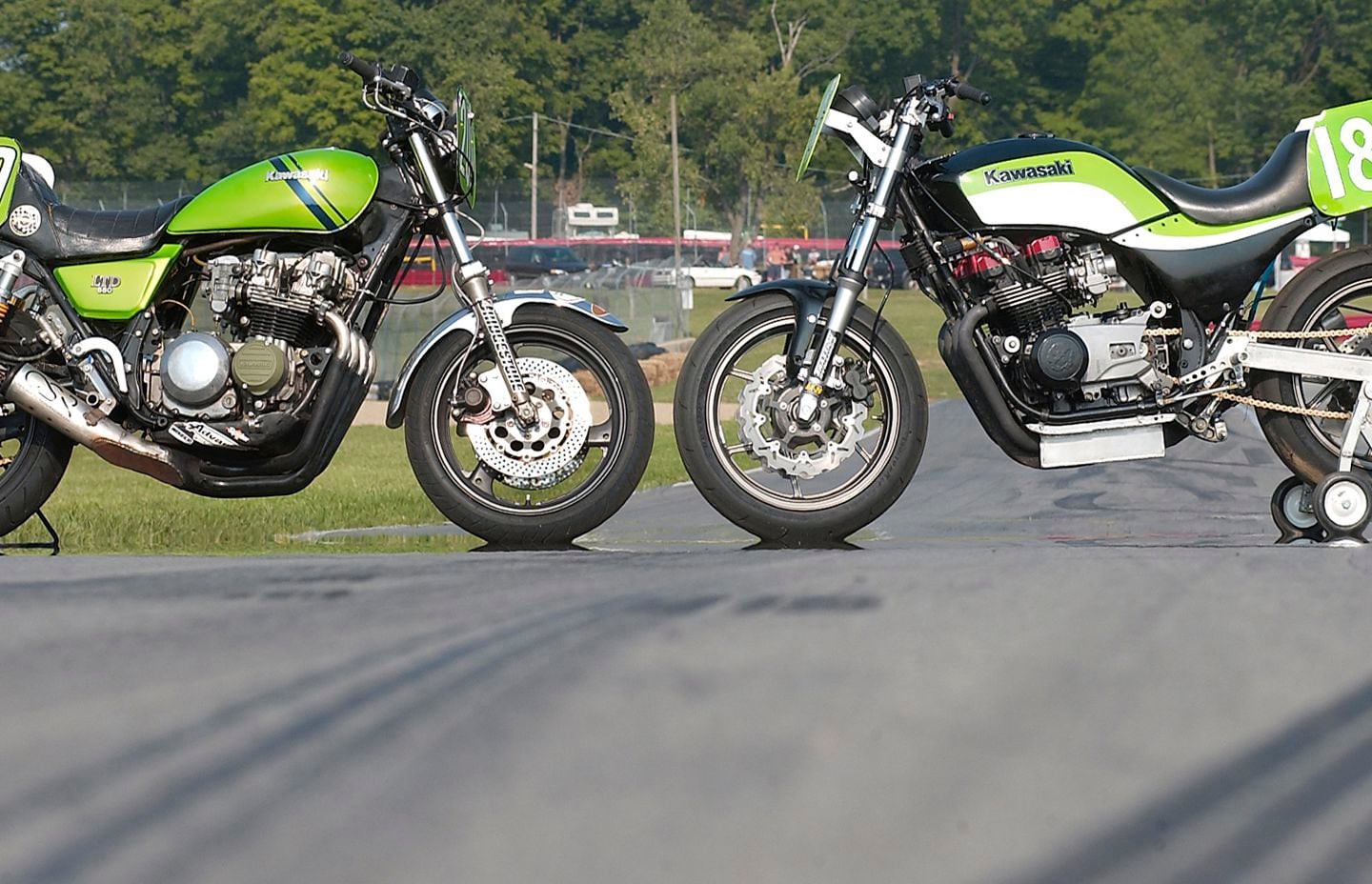
/cloudfront-us-east-1.images.arcpublishing.com/octane/PXSKCTIGWM656G5UU2N57XKHN4.jpg)
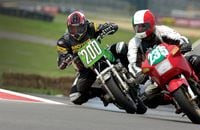
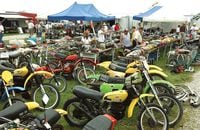
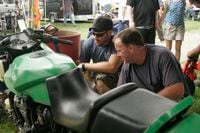
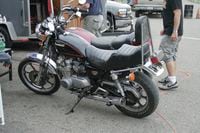
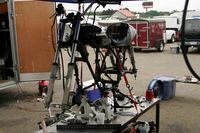
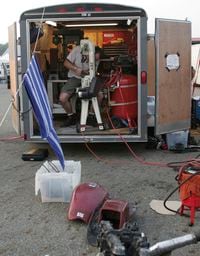
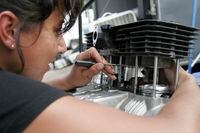
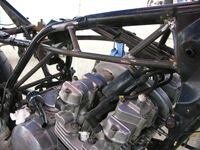
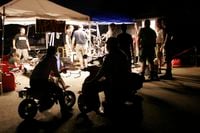
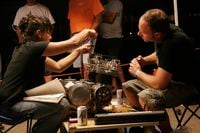
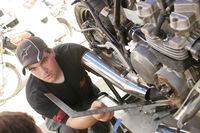
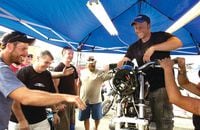
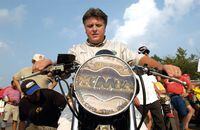
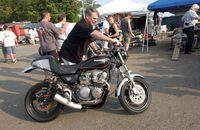
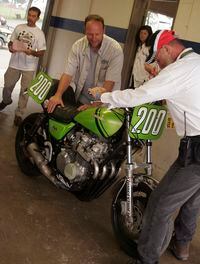
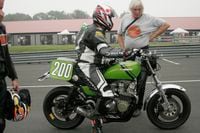
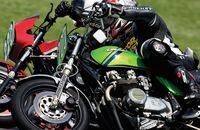
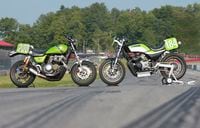
/cloudfront-us-east-1.images.arcpublishing.com/octane/TNOU5DNE2BC57MFPMGN2EIDXAM.jpg)
/cloudfront-us-east-1.images.arcpublishing.com/octane/GTCXACQGJ5HAPDTGWUQKDEH44E.jpg)
/cloudfront-us-east-1.images.arcpublishing.com/octane/S35YGSEMEZB4BLTDJTSZPF4GLA.jpg)
/cloudfront-us-east-1.images.arcpublishing.com/octane/5UOT6HPX2JFMRJAX6EH45AR4MQ.jpg)
/cloudfront-us-east-1.images.arcpublishing.com/octane/OKWOJWAKP5EP3OACCRRWPCIX2Q.jpg)
/cloudfront-us-east-1.images.arcpublishing.com/octane/2WF3SCE3NFBQXLDNJM7KMXA45E.jpg)
/cloudfront-us-east-1.images.arcpublishing.com/octane/G4MG6OUCJNBSHIS2MVVOTPX65E.jpg)
/cloudfront-us-east-1.images.arcpublishing.com/octane/IIGGWFOTOJGB7DB6DGBXCCMTDY.jpg)
/cloudfront-us-east-1.images.arcpublishing.com/octane/QSTCM6AVEZA5JJBUXNIQ3DSOF4.jpg)
/cloudfront-us-east-1.images.arcpublishing.com/octane/U4I7G625B5DMLF2DVIJDFZVV6M.jpg)
/cloudfront-us-east-1.images.arcpublishing.com/octane/B6XD6LS6IVCQPIU6HXDJSM3FHY.jpg)
/cloudfront-us-east-1.images.arcpublishing.com/octane/ICL63FEDDRDTTMINYICCEYGMDA.jpg)
/cloudfront-us-east-1.images.arcpublishing.com/octane/FCGZHQXRBZFLBAPC5SDIQLVF4I.jpg)
/cloudfront-us-east-1.images.arcpublishing.com/octane/WNOB6LDOIFFHJKPSVIWDYUGOPM.jpg)
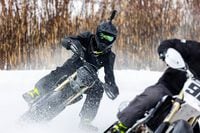
/cloudfront-us-east-1.images.arcpublishing.com/octane/X33NU3E525ECRHXLNUJN2FTRKI.jpg)
/cloudfront-us-east-1.images.arcpublishing.com/octane/6KKT5NNL2JAVBOXMZYS5ZO76YA.jpg)
/cloudfront-us-east-1.images.arcpublishing.com/octane/J5RKG5O455GMPGQRF2OG6LRT7A.jpg)
/cloudfront-us-east-1.images.arcpublishing.com/octane/GX2CIZKQVRH2TATDM26KFG2DAE.jpg)
/cloudfront-us-east-1.images.arcpublishing.com/octane/ZWIDYSAKQZHD5BHREMQILXJCGM.jpg)
/cloudfront-us-east-1.images.arcpublishing.com/octane/CYUHJZCTSJCH3MRAQEIKXK7SCQ.jpg)
/cloudfront-us-east-1.images.arcpublishing.com/octane/LKOFINY56FCXJCANJ5M7ZDQUBY.jpg)
/cloudfront-us-east-1.images.arcpublishing.com/octane/4NBPDACMWJH63JQYJVK3QRBDZI.jpg)
/cloudfront-us-east-1.images.arcpublishing.com/octane/KKHQHRR3FJGX7H2IPU6RALMWG4.jpg)